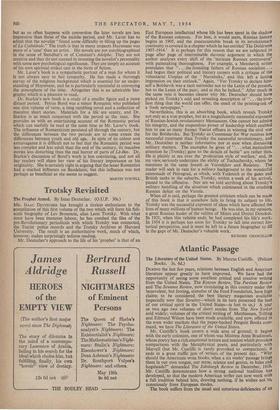Trotsky Revisited The Prophet Armed. By Isaac Deutscher. (O.U.P. 30s.)
MR. ISAAC DEMMER has brought a tireless enthusiasm to the compilation of this first volume of the two which will form his full- scale biography of Lev Bronstein, alias Leon Trotsky. With what must have been immense labour, he has combed the files of the pre-Revolutionary periodicals with which Trotsky was connected, the Tsarist police records and the Trotsky Archives at Harvard University. The result is an authoritative work, much of which, however, makes surprisingly tedious reading. Mr. Deutscher's approach to the life of his 'prophet' is that of an East European intellectual whose life has been spent in the shadow of the Russian colossus. For him, it would seem, Russian history begins in 1905, and the unaccountable break in its revolutionarY continuity is covered in a chapter which he has entitled 'The Doldrums 1907-1914.' It is perhaps for this reason that we are subjected to page after page of interminable slavonic argument in which tho author analyses every shift of the 'intricate Russian controversy' with painstaking thoroughness. For example, a Menshevik writer postulates that "... the founding fathers of Russian socialism .. • had begun their political and literary careers with a critique of the voluntarist Utopias of the ` Narodniks,' and this left a lasting impression on their outlook." Again, "For Trotsky to declare him- self a Bolshevik was a tacit surrender not to the Lenin of the present, but to the Lenin of the past; and at this he balked." After much in the same vein it becomes clearer why Mr. Deutscher should have picked on Trotsky's odd and revealing description of "... the love- liest thing that the world can offer, the smell of the printing-ink of a fresh newspaper."
Nevertheless, this is an absorbing book, which reveals Trotsky not only as a true prophet, but as a magnificently successful exponent of Russian-Jewish revolutionary Messianism. One cannot but admire his integrity,, and the stupendous power of leadership which enabled him to use so many former Tsarist officers in winning the civil war for the Bolsheviks. But Trotsky as Commissar for War receives less successful treatment than Trotsky the successful revolutionary, and Mr. Deutsbher is neither informative nor at ease when discussing military Matters. The examples he gives of "... what meticulous attention he [Trotsky] gave to the details of battle" are rather thin. He is plainly at sea over the 'proletarian style of warfare,' and, in my view, seriously underrates the ability of Tuchachevsky, whom he mentions in the same breath as Voroshilov and Budenny. The reader will seek in vain for a military background to the wonderful cannonade of Petrograd, at which, with Yudenich at the gates and British tanks in the suburbs, Trotsky, within a week of his arrival, passed to the offensive. Nor are we told anything about Trotsky's military handling of the situation which culminated in the crushing Russian defeat on the Vistula.
When all is said, perhaps the greatest criticism which can be made of this book is that it somehow fails to bring its subject to life. Trotsky was the successful exponent of ideas which have affected the lives of many millions of human beings. He was also, in my opinion, a great Russian leader of the calibre of Minin and Dmitri Donskoi. In 1921, when this volume ends, he had completed his life's work. In 1954 it is perhaps too soon for Trotsky to fall into correct his- torical perspective, and it must be left to a future biographer to fill in the gaps of Mr. Deutscher's valuable work.
RICHARD CHANCELLOR










































 Previous page
Previous page